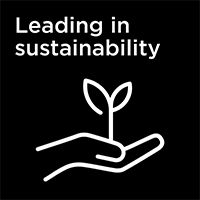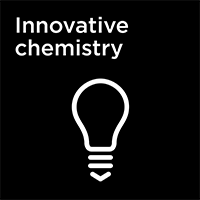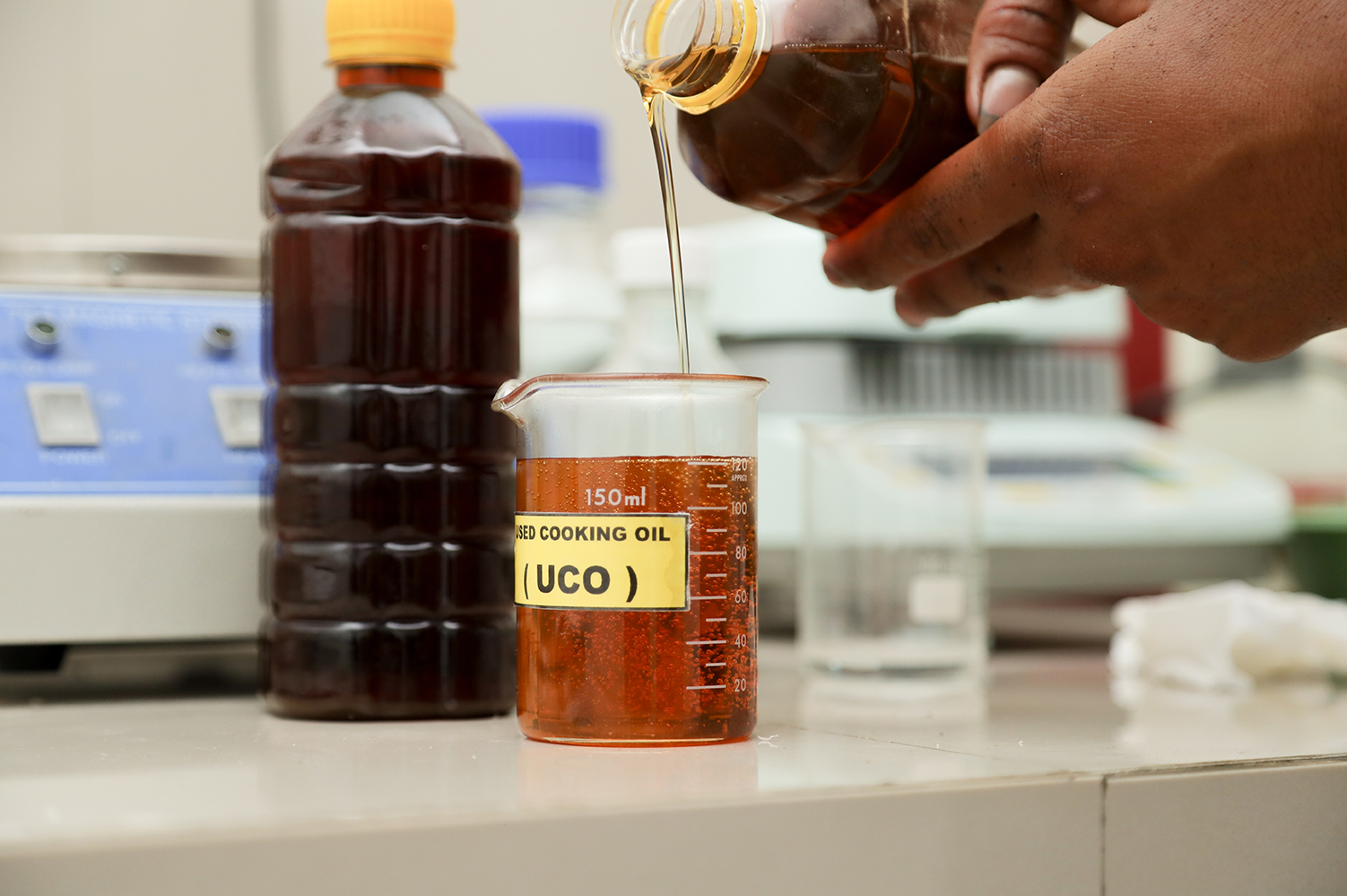Clean fuels
Clariant’s range of next-generation adsorbents help tap into more sustainable feedstocks for renewable fuels.



Delivering on Clariant's purpose »Greater chemistry - between people and planet.«
This story is an example of how Clariant delivers on its purpose-led strategy.
Is the biofuel industry approaching a feedstock crunch? The question, raised in December of 2022 by the International Energy Agency (IEA), rattles industries and policymakers the world over. That is because such renewable fuels are vital in the fight against climate change. Especially when made from waste products or agricultural residues they have the potential to transform transportation, particularly in areas that are hard to electrify such as trucking, shipping and aviation. Demand for sustainable biofuels is projected to grow significantly, notably due to legislative targets and incentives. If demand were to outstrip supply, that could spell trouble, especially for feedstocks such as used cooking oils (UCOs). Clariant's next generation of adsorbents can help alleviate the problem by allowing producers of biodiesel, renewable diesel and sustainable aviation fuel (SAF) to tap into an ever-wider range of sustainable feedstocks.
Nearly tenfold growth
Biofuels are a global success story. Since 2000, production worldwide has increased roughly tenfold to about 175 billion liters per year, replacing ever more fossil fuels in transportation. And the ramp-up continues: According to recent IEA estimates, total annual biofuel demand will increase by about 35 billion liters between 2020 and 2027. For sustainable aviation fuel the IEA’s conservative estimate is an eightfold increase. During that same period, demand for vegetable oils, waste, and residue oils and fats to make biodiesel and renewable diesel will increase by 56%. »The feedstock market is already stretched to its limits,« says Carlos Rodríguez, Head of Product Management & Technical Sales Purification EMEA, Adsorbents & Additives. »This forces producers to use lower qualities than their facility designs allow, adding considerable stress to their units.«
Not all biofuels are created equal. Both biodiesel and renewable diesel are made from bio-based sources such as vegetable oils or animal fats. Burning these releases only carbon that was previously taken out of the atmosphere. In the case of renewable diesel, this cycle can reduce the release of greenhouse gas emissions by up to 80% compared to conventional diesel – always depending on the raw materials used to make the fuel.
»Compared to virgin vegetable oils, alternative feedstocks contain more and a much wider range of contaminants which need to be removed.«
Vinicius Ribeiro Celinski, Head of R&D and BD Purification, Adsorbents & Additives

A more sustainable path
Making renewable diesel or biodiesel from virgin vegetable oils is straightforward and can be sustainable. But it has its drawbacks: Producing vast amounts of virgin vegetable oil requires intensive agriculture and uses large areas of arable land, water, and other natural resources that could otherwise be used for food production. This could lead to even more deforestation and exacerbate food crises. A much more sustainable path is to use waste and residue oils and fats. These neither take up additional resources nor do they compete with food production. That is why regulators and markets are pursuing the shift from virgin oils to so-called second-generation and advanced feedstocks made from used cooking oils (UCOs), waste animal fats, and palm oil mill effluents (POMEs). For example, both the EU's Fit for 55 package and the revised Renewable Energy Directive (RED III) clearly favor these waste feedstocks, alongside advanced biofuels produced from agricultural or forestry residues.
»However, compared to virgin vegetable oils, these alternative feedstocks contain more and a much wider range of contaminants,« explains Dr. Vinicius Ribeiro Celinski, Head of R&D and BD Purification, Adsorbents & Additives. »We find compounds containing metals like magnesium or calcium and also phosphorus, which can lead to catalyst poisoning. These are distinct from the ones found in virgin oil and require highly advanced adsorbents with unique binding abilities. Additionally, you need to deal with impurities like soaps, phosphatides, or chlorine that are prevalent in certain waste oils.« This new level and the variety of contamination can gum up the production process – sometimes quite literally – significantly affecting throughput and yields.

Effectively removing contaminants
Clariant's solution comes in the form of its Tonsil™ RNF series of highly effective adsorbents and refining aids. These porous silicates are widely used in the purification of edible oils in about 130 countries across the globe. An outstanding property is their large reactive surface area. A single gram of Clariant's products has a surface area of more than 200 square meters – about half the size of a basketball court. This large reactive area, together with Clariant's proprietary treatment, makes the Tonsil™ RNF series so effective in removing contaminants both in the pre-treatment of feedstocks and the post-treatment or »polishing« of biodiesel to meet the required specifications.
»Tonsil™ not only reduces this adsorbent dosage and the associated cost but also increases plant throughput and helps to minimize oil retention in the cake.«
Carlos Rodriguez, Head of Product Management & Technical Sales Purification EMEA, Adsorbents & Additives

35% shorter filtration times
What makes Clariant's latest generation of adsorbents especially useful to producers is how they increase throughputs during filtering: »The filter is one of the most critical sections of a pre-treatment unit and a bottleneck for most operations,« says Jorge Herrero, Technical Support Manager Purification EMEA. »Since a filter cake is formed with the adsorbent, its quality and development are critical. A stable and especially homogenous filtration ensures that contaminant removal is spread across the entire filter cake.« That is where Clariant's next-generation adsorbents come in, especially Clariant's Tonsil™ RNF 919X FF and its newly launched Tonsil™ RNF 719X FF series. Recent lab tests have shown roughly 35% shorter filtration times with Clariant's new adsorbents compared with past generations.
Using advanced adsorbents boosts productivity. It also cuts costs, not only by prolonging catalyst lifecycles. »The complex contaminant profile and the higher level of contaminants found in alternative feedstocks call for drastically higher adsorbent dosing,« says Carlos Rodríguez. »As a highly activated and selective adsorbent, Tonsil™ not only reduces this adsorbent dosage and the associated cost but also increases plant throughput and helps to minimize oil retention in the cake.« Plus, as a multipurpose system, Clariant's Tonsil™ range offers the necessary flexibility, which is crucial to adopting an ever-wider range of waste feedstocks that further reduce greenhouse gases and our dependency on fossil fuels. All the more reason why adsorbents will play a central role in the next chapter of bio- and renewable fuel's success.
By partnering with Clariant, producers gain access to a global network comprising 28 production sites, efficient logistics, and dedicated technical support. This ensures a dependable supply of specialty adsorbents and hands-on assistance to meet the rising demand.
_______________________________________________________________
AMOMAX-CASALE: 过去、现在与未来
我们采访了领导AmoMax-Casale合作项目的两位专家:科莱恩催化剂全球研发总监马艾德(Marvin Estenfelder/ME)和卡萨利首席技术官Ermanno Filippi (EF)。
此项目是什么时候开始启动的?
我们的项目于2016年启动,从产品研发到实现成功行业应用,总共不到四年时间(ME)当时是哪些原因促成了此次合作?
当时我们一直在寻找一款活性更高、能够与卡萨利氨合成塔技术相匹配的催化剂产品。AmoMax-Casale正是两大团队开展多学科协作的重要成果。(EF)AmoMax-Casale的第一家客户对该产品非常满意。请问下一步有什么计划?
目前多家客户都对AmoMax-Casale产生了浓厚的兴趣。第二家客户也已确定在其氨合成反应器中采用这款产品。我们相信,从明年开始,该产品将会在更多项目中得到应用。客户是否需要对当前的生产工厂进行调整?
客户需要考虑的唯一重要事项是:他们的反应器内件需由卡萨利设计和批准。与此同时,卡萨利对氨合成塔进行的额外翻新改造有助于提升工艺效率、从而提升经济效益。(ME)该新型催化剂将会给哪些终端市场获益最多?
目前,超过70%的氨被用于化肥生产。未来,由于AmoMax-Casale可应用于蓝氨和绿氨生产工艺,能源市场的重要性将会逐步上升。(ME)AmoMax-Casale上市之后,合成氨市场的需求是否将进一步扩大?
AmoMax-Casale是合成氨生产技术面向节能减排迈出的重要一步。未来,蓝氨与绿氨将在能源与储氢以及“零碳排放”发电中发挥重要作用,而节能减排则是实现蓝氨与绿氨生产的先决条件。(EF)科莱恩与卡萨利近期还会开展哪些合作项目?
未来,卡萨利和科莱恩将继续在其他合成氨项目中开展合作,同时也会共同开发更多创新性技术,助力客户实现“零碳排放”的目标。 _________________________________________________________________


